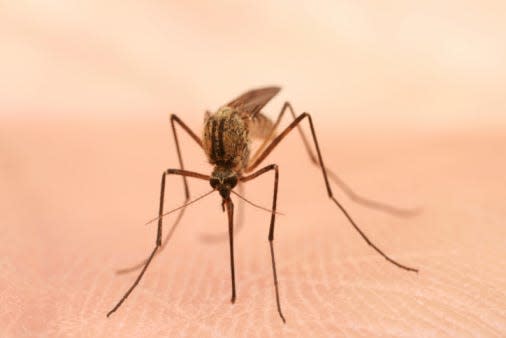West Nile Virus detected in mosquitoes in Fall River
FALL RIVER — West Nile Virus has been detected in mosquitoes collected in Fall River, the state Department of Public Health announced on Thursday.
According to a press release from the city's Department of Health and Human Services, Massachusetts has seen three human cases of West Nile Virus this year — all of them in the last two weeks — and there have been 118 positive mosquito samples across the state since the beginning of June.
West Nile Virus is most commonly spread by the bite of an infected mosquito.
The virus can cause illness ranging from a mild fever to more serious disease like encephalitis or meningitis. About 80% of people who become infected will experience no symptoms; those who develop symptoms may experience fever, headache, body aches, nausea, vomiting, rashes or swollen lymph glands.
Less than 1% of people infected develop severe illness, with symptoms including a high fever, neck stiffness, stupor, coma, convulsions, vision loss, numbness and paralysis.

While West Nile Virus can infect people of all ages, people over the age of 50 are at higher risk for severe infection.There are no vaccines protecting against West Nile in humans, and no specific treatments for symptoms. Health officials recommend residents take the following precautions to protect themselves and avoid being bitten.
Tips for mosquito-proofing yourself
Wear insect repellent outdoors: Use a spray with DEET, permethrin, picaridin, IR3535 or oil of lemon eucalyptus according to the instructions on the product label. DEET products should not be used on infants under two months of age and should be used in concentrations of 30% or less on older children. Oil of lemon eucalyptus should not be used on children younger than 3. Permethrin products are intended for use on clothing, shoes, bed nets and camping gear, and should not be applied to skin.
Cover your skin: Wear long sleeves, long pants and socks outdoors.
Beware of peak mosquito hours: Feeding time for many mosquitoes is from dusk to dawn. Curb your outdoor activities in evening or early morning, or cover up and wear insect repellant.
Drain standing water: Many mosquitoes lay their eggs in standing water. Check your home for items that hold rainwater and drain them, including gutters, flowerpots, wading pools and birdbaths.
Keep mosquitoes outside: Some mosquitoes like to come indoors. Keep them outside by having tightly-fitting screens on all your windows and doors.
Information about WNV and reports of current and historical WNV virus activity in Massachusetts can be found on the MDPH website at: www.mass.gov/dph/mosquito.
This article originally appeared on The Herald News: West Nile found in Fall River; residents urged to take precautions
